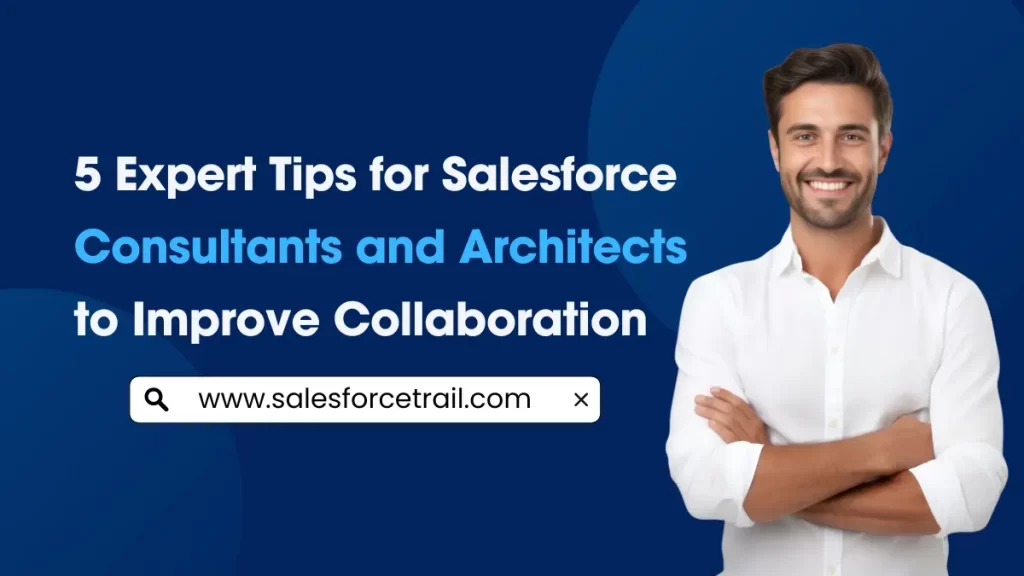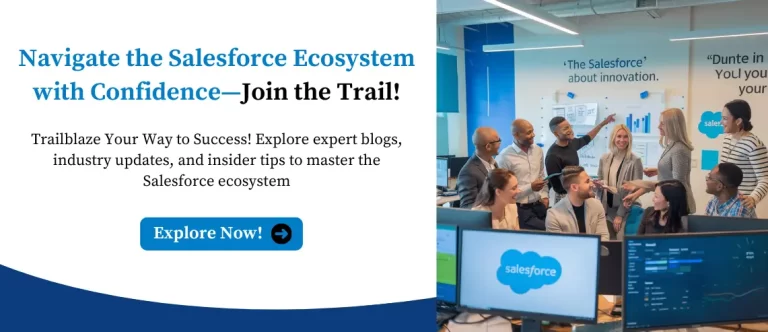When it comes to building great Salesforce solutions, no one can do it alone. Behind every successful project, there’s strong collaboration between Salesforce Consultants and Architects. These two roles bring different strengths to the table consultants know the business inside out, while architects focus on building technical solutions that are scalable and reliable.
Here are 5 expert tips for Salesforce Consultants and Architects to improve collaboration and achieve smoother, faster, and more successful outcomes.
Understand the “Why” Before Planning the “How”
One of the biggest mistakes in Salesforce projects is jumping straight into designing solutions without understanding the business need. Architects may begin to consider system design, whereas consultants concentrate on user stories. But if the team doesn’t agree on the “why”, things can fall apart quickly.
How to fix it:
- Start every project by discussing the business goals.
- Ask questions like: “What problem are we solving?”, “Who will use this?”, “What does success look like?”
- Establish a shared understanding of what the client needs.
When both consultants and architects begin with a clear goal, it becomes much easier to decide how to build the right solution.
Speak Clearly and Avoid Too Much Technical Jargon
Let’s face it, Salesforce can be full of technical terms. Apex, APIs, record-triggered flows, and data model design can be overwhelming. Architects often speak in technical language, while consultants may come from a more business-focused background. When team members lack mutual understanding, errors are likely to occur.
What you can do:
- Use simple words when explaining ideas.
- Draw diagrams or flowcharts to showcase how things will work.
- Always explain how technical solutions will help the business.
Clear communication makes everyone more confident in their decisions and helps avoid confusion or delays later on.
Define Roles and Responsibilities from Day One
Even the most experienced Salesforce teams can struggle if no one knows who is responsible for what. Consultants and architects might end up doing the same tasks—or worse, assume the other person is handling something important.
To prevent this issue, spend some time at the beginning of the project to clarify roles. The daily responsibilities of someone with the title “Consultant” or “Architect” can vary based on the specific project they are working on.
Try this approach:
- Use a RACI matrix (Responsible, Accountable, Consulted, Informed).
- List all key project tasks ( discovery, documentation, testing, etc.).
- Agree on who will lead each task and who needs to be involved.
When everyone knows their responsibilities, the team works more efficiently and avoids missed deadlines or duplicated work.
Work Together, Not in Silos
One common challenge in Salesforce projects is that consultants and architects often work separately. Consultants gather requirements, then “hand off” the project to architects who design the solution. This approach can lead to missed details, rework, and delays.
Instead of working in silos, collaborate frequently throughout the project.
Best practices:
- Hold weekly review meetings to share progress and get feedback.
- Use tools like Slack or Microsoft Teams for quick questions.
- Collaborate on documents using tools like Quip or Google Docs.
- Review designs together before starting the build phase.
By working closely throughout the project, both sides stay aligned and can catch problems early saving time and effort later.
Focus on Performance and Scalability from the Start
Salesforce Consultants specialize in understanding user needs, whereas architects focus on the technical aspects of implementation. A feature that appears beneficial in theory might struggle to function effectively when thousands of users are using it.
Consultants and architects should consider performance and scalability from the beginning to avoid issues later on.
Here’s how:
- Ask: “Will this feature still be functional if our user base expands?”
- Consider factors such as governor limits, types of automation, and the amount of data.
- Discuss when to use Flows, Apex, or third-party tools.
- Plan for long-term maintenance, not just the launch.
By thinking ahead, you can avoid system slowdowns or limitations that require costly fixes later on.
Final Thoughts: Build Stronger Projects Through Better Teamwork
Great Salesforce solutions don’t happen by chance. They’re built by teams that understand each other, communicate clearly, and work together every step of the way.
These tips for Salesforce Consultants and Architects are more than just advice—they’re actions you can take today to improve collaboration, speed up delivery, and build solutions that work.
When consultants and architects combine their strengths, the result is a Salesforce solution that’s not only powerful but also scalable, user-friendly, and built for long-term success.
Must Visit Links:
- How Much You Can Earn as a Salesforce Consultant in 2025?
- Top Most In-Demand Salesforce Skills for 2025: What Professionals Need to Know
- The Importance of Hands-On Experience in Mastering Salesforce Skills
- How I Passed the Salesforce Data Architect Exam on My First Attempt
- How to Prepare for the Certified Agentforce Specialist Certification Exam
Resources
- [Salesforce Developer]- (https://developer.salesforce.com/)
- [Salesforce Success Community] (https://success.salesforce.com/)
For more insights, trends, and news related to Salesforce, stay tuned with Salesforce Trail
Mark Jacobes is a seasoned Salesforce expert, passionate about empowering businesses through innovative CRM solutions. With over 6 years of experience in the Salesforce ecosystem, Mark specializes in Salesforce development, integrations, and digital transformation strategies.
- Mark Jacobeshttps://salesforcetrail.com/author/markjacobes/September 8, 2025
- Mark Jacobeshttps://salesforcetrail.com/author/markjacobes/
- Mark Jacobeshttps://salesforcetrail.com/author/markjacobes/
- Mark Jacobeshttps://salesforcetrail.com/author/markjacobes/













